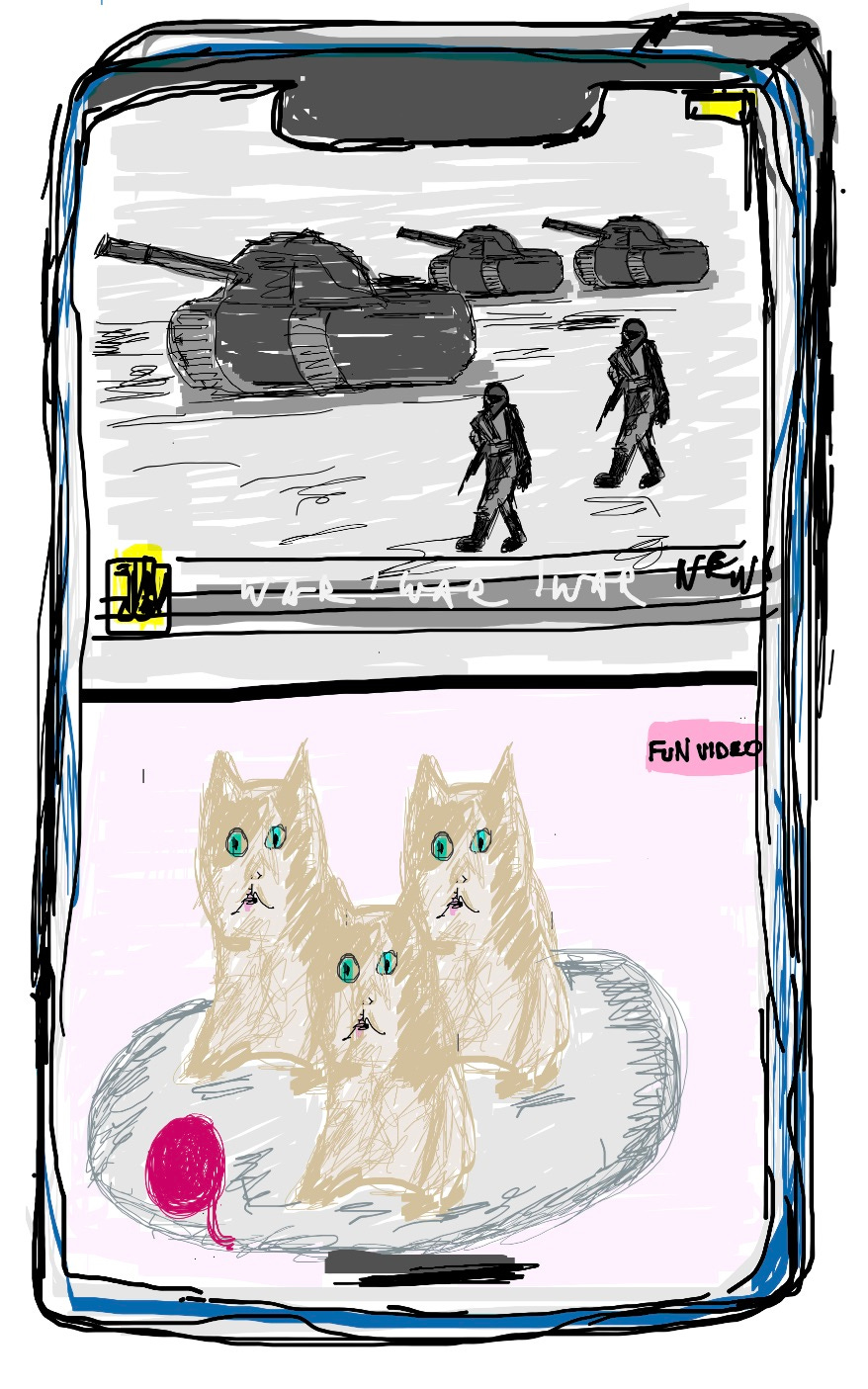Entertainment is King
The news has had to adapt or die. And adapt it did. But it may have also died in the process.
Last broadcast’s Coherence Metric score was 2.83 ,placing it #17 overall! To understand what the Coherence Metric score is, check it out here :)
Hello everyone, today’s broadcast is more of a collection of reflections of a book I’ve been currently reading, which I could not resist translating into a broadcast. Although I am only three quarters of a way through, “Amusing Ourselves to Death: Public Discourse in the Age of Show Business” by Neil Postman, whose insightful commentary from the 1980’s is only ever more prescient in the world of today.
Neil Postman details the transition between a world dominated by written word, with books and newspapers, to a world shaped by television, and to a lesser extent, the telegraph. What was once explained and explored in a series of books, was now only expressed in briefer news segments. In the age of television, the news and other informative sources now had to deal with entertainment sources - The competition for the audiences attention has only gotten more and more fierce, often being swallowed up by entertainment.
As such, news has had to adapt or die. And adapt it did. But it may have also died in the process. Not to be misunderstood, neither Postman and I want to claim that the news language and landscape was perfect, but its adoption into the age of television has set it on an irreversible, deteriorating course.
In order to not fall complete prey to the onslaught of entertainment, it had to adopt some characteristics of entertainment itself. That meant using the “language of headlines: sensational, fragmented and impersonal”. The power that stems from using the power of headlines is not the ability to convey context-backed information, but to attract eyeballs- accuracy of information or suggested conclusions was of secondary importance. Additionally note that these headlines now had the same ultimate goal as entertainment: gathering as much attention as possible.
Much of the news become less interconnected: as Postman states, each headline message “had no connection to which preceded it or followed it”. Each news segment changes from topic to topic, and there is no staying power in each of them: it is rare that any of these stories are related to any others. Postman emphasized the dangers of the ‘now this’ phenomenon, the way in which news outlets often transition to different segments. Postman equates to wiping a blank slate in the viewers’ minds, an indication that the previous information is totally uncorrelated to the upcoming information.
As a result, what you get is news who give you brief snippets of information about something, and then ‘now this’-ed that story into oblivion: most of these stories only have a lifespan of one day, never to be covered again. Even the main, biggest stories wither away after a while: and once withered, they are very rarely returned to and reflected upon.
There are some very real consequences that stem as a result of these changes: for one, both the quality and quantity of information retained by viewers decreases: the news transitions so quickly between a multitude of stories, that the brevity of such uncorrelated segments makes it difficult to accurately recall what was shown. Furthermore, the information provided is so brief and devoid of context, that it is more accurate to say that if someone watches the news, they know “of these events, not the events themselves”.
It is even harder for people to retain information due to how television is consumed: unlike a book, where you have usually dedicate entire focus, not move around much. However, television can be switched on and put in the background whilst doing other things, lowering your ability to retain anything that is said.
Another consequence of such a format is that it begins to dip into an “epistemology based on the assumption that all reports of cruelty and death are greatly exaggerated … not to be responded to sanely”. The constant switch to topic to topic also serves to undermine the severity of the news delivered. Surely it’s not that bad or serious if the news can quickly move on to some heartwarming story?
Postman also argued that television had become the “command center of the new epistemology… there is no subject of public interest … that does not find it’s way to television". Furthermore, “ [TV] has become our culture.. we rarely talk about television, only what is on television{emphasis in original}”. Television became the source of everything, not just news and entertainment, but recommendations, opinions, things to talk about work; everything.
The New Landscape
While the television revolutionized culture, smartphones turbocharged this to an even higher degree, especially in the last two to three years. While the television could be seen a medium of a myriad of things, phones are even more so: you can get entertainment, banking services, shopping and delivery, news, information all from one device: and all of these compete with each other for screen time on a persons phone.
Of course, I’m talking about phones, but its also the dual impact of social media. These platforms became the go to for everything, but in a much closer manner than television: If one wanted to switch away from a news broadcast, one would have to physically change the channel, assuming you had access to a different network. However with social media, everything is piled in there, regardless of how smart or stupid it is. The competition is so might tighter as someone can easily swipe your things away with minimal effort, and be greeted with something else entirely instantaneously.
Moreover, With these platforms only feeding someone content they expressively like, now more than ever media has to pay supremely close attention to that people want to see, if they want their content to be seen and to generate revenue for themselves. However, what people should know and what people want to know rarely overlap, leaving media with a difficult choice → Do i cover everything I should, and risk losing viewership and revenue? Or do I only cover the things people want to see anyway, and be able to have more financial security?
The New Population
The use of phones actually draws elements from the era of literacy and books too: Not unlike a book, using your phone usually requires focus, and the rest of your body to be motionless. However, unlike your body, the mind is spinning at unsustainable rates, unable to retain the sheer content available to it.
While Postman spoke of an “information glut” then, it pales in comparison to the swathe and troughs of worthless posts, videos and reactions out there. Calling some of that pollution ‘worthless’ is an understatement, as I firmly believe some of it has a net negative outcome on anyone unfortunate or stupid enough to consume it. And yet, even this waste is often packaged up as entertainment, as is just another thing that the news has to contend with.
One other aspect of today’s life is that in order to try absorb as much of this poison as we can, our attention spans are cooked: withered away by pointless posts that serve no meaning other than to clog up your time. As a result, we either want to watch shorter and shorter things, or want to try cram and do or take in as many things as possible(more on this later).
We spend so much time on phones and social media, but how much of it actually makes us better? I get that we can’t always be improving ourselves and we do deserve some time to relax and unwind, but how many of you would describe what you watch on these social platforms as ‘quality entertainment’- if it wasn’t so absurdly easy to watch or move on from each of these posts, would you even watch them in the first place?
Evolution By Devolving
How has news adapted to this change in scenario? What were once news segments have become seconds-long clips or the briefest of slideshows, with a link to a full article burrowed away somewhere at the bottom of the post, with the organisations fully aware that only a tiny fraction actually follow through to find out more.
At most you will get 1 to 2 minutes clips on one topic, but even that will be fluffed up with fancy graphics or repetition of headlines. The aforementioned language of headlines has been fully optimised, forsaking any pretense of context for the most eye-catching headlines. News outlets have doubled down on their partisan leanings in order to capture more of their main base, knowing that by treading the middle, they will only be ignored by both sides. News that should be covered for a better understanding of the world is often neglected, while trivial or nothing-stories with more exciting topics such as murder, celebrities and the like are often pushed out.
There is now very little that differentiates content creators from formerly serious news organisations, but I don’t think you can entirely blame them: in this world we have created, you need play the game or fade into obscurity.
Not every news organisations have sold their soul to the algorithms entirely. One uplifting but sad example of this is Roca News: a new organization that was set up by a few people, in order to try provide a more refreshing attempt at news, devoid of the partisanship and bias seen in almost every other organization. I have seen genuine efforts by them to remain un-biased, and are not afraid to rephrase or apologize after receiving feedback from the public.
In order to grow their platform, they have had to adapt to the times to try attract eyeballs: and the way they have done it is by gamifying reading the news: on their app you collect points from reading different stories, you can unlock different templates for your profile, there’s a score, etc.
In addition, the information relating to stories often written in tight concise summaries- but no matter how concise you are, if not enough space is dedicated you will not be able to provide full context from any story.
Now, it does seem like I am criticizing them here, but they do seem to be the best newly- founded news platforms, covering a wider variety of news in a more descriptive than subjective lens. Check them out here: RocaNews
Counting Down to the Future
One future trend that I have seen is that posts are now beginning to have two videos playing at once: the top half may be a snippet of a podcast or a different video, while the bottom half is a clip of some gameplay, completely unrelated to the top. This outbreak was first spotted on the app Tik Tok, and has since seeped into other social media platforms. But I believe this is an indication of how the news media can devolve further:
I don’t believe that its too ridiculous to think that in the upcoming years, in order to pander to ever shorter attention spans, news media will themselves be posting similar content to this, where there may be coverage of an ongoing conflict in the Saheel region, while on the bottom half there is a clip of a cat video.
At one point there may even be a reason to completely remove the top half of that video, in order to make room for more entertainment gimmicks: Maybe all that will be left of the actual news itself are voice overs of headlines, deafened by a background jingle to maintain our focus. We have not reached this point yet, but the fact that there is a remote possibility is incredibly pathetic and sad.
While I think that we haven’t amused ourselves to death yet, we should really see a doctor soon. The consequences of an uninformed public are one of the gravest threats that can fly so easily under the radar, made all the worse that no-one is pushing us into this abyss, we are the ones culpable for the way this has worked out too.
I’m not going to pretend that I’m some patron saint who doesn’t waste any time on social media, but I am trying to reduce its impact on my life. Even the KWR has received feedback from numerous sources that it should be shorter: but then again, that might just be that what I’m writing isn’t too interesting- you be judge :)
Make sure to give this broadcast a coherence score!
That’s all from me for now, but stay tuned for future broadcasts,
This has been Kunga’s Written Radio,
Check out last week’s broadcast here →









